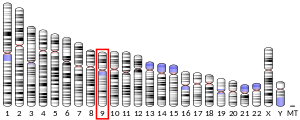NPR2
Natriuretic peptide receptor B/guanylate cyclase B (atrionatriuretic peptide receptor B), also known as NPR2, is an atrial natriuretic peptide receptor. In humans it is encoded by the NPR2 gene.[5]
A mutation of the NPR2 gene can result in disproportionate dwarfism with short limbs.[6]
See also[]
- Atrial natriuretic peptide receptor
- Dwarfism
References[]
- ^ a b c GRCh38: Ensembl release 89: ENSG00000159899 - Ensembl, May 2017
- ^ a b c GRCm38: Ensembl release 89: ENSMUSG00000028469 - Ensembl, May 2017
- ^ "Human PubMed Reference:". National Center for Biotechnology Information, U.S. National Library of Medicine.
- ^ "Mouse PubMed Reference:". National Center for Biotechnology Information, U.S. National Library of Medicine.
- ^ "Entrez Gene: NPR2 natriuretic peptide receptor B/guanylate cyclase B (atrionatriuretic peptide receptor B)".
- ^ Tsuji T, Kunieda T (April 2005). "A loss-of-function mutation in natriuretic peptide receptor 2 (Npr2) gene is responsible for disproportionate dwarfism in cn/cn mouse". The Journal of Biological Chemistry. 280 (14): 14288–92. doi:10.1074/jbc.C500024200. PMID 15722353.
Further reading[]
- Fox AA, Collard CD, Shernan SK, Seidman CE, Seidman JG, Liu KY, et al. (April 2009). "Natriuretic peptide system gene variants are associated with ventricular dysfunction after coronary artery bypass grafting". Anesthesiology. 110 (4): 738–47. doi:10.1097/ALN.0b013e31819c7496. PMC 2735337. PMID 19326473.
- Potthast R, Abbey-Hosch SE, Antos LK, Marchant JS, Kuhn M, Potter LR (November 2004). "Calcium-dependent dephosphorylation mediates the hyperosmotic and lysophosphatidic acid-dependent inhibition of natriuretic peptide receptor-B/guanylyl cyclase-B". The Journal of Biological Chemistry. 279 (47): 48513–9. doi:10.1074/jbc.M408247200. PMID 15371450.
- Liew D, Schneider H, D'Agostino J, Shaw J, Krum H (March 2004). "Utility of B-type natriuretic peptide as a screen for left ventricular dysfunction in patients with diabetes: response to Epshteyn et al". Diabetes Care. 27 (3): 848, author reply 848-9. doi:10.2337/diacare.27.3.848. PMID 14988324.
- Antos LK, Abbey-Hosch SE, Flora DR, Potter LR (July 2005). "ATP-independent activation of natriuretic peptide receptors". The Journal of Biological Chemistry. 280 (29): 26928–32. doi:10.1074/jbc.M505648200. PMID 15911610.
- Poreba R, Poczatek K, Gać P, Poreba M, Gonerska M, Jonkisz A, et al. (April 2009). "SNP rs198389 (T-381 C) polymorphism in the B-type natriuretic peptide gene promoter in patients with atherosclerotic renovascular hypertension". Polskie Archiwum Medycyny Wewnetrznej. 119 (4): 219–24. PMID 19413180.
- Koller KJ, Goeddel DV (October 1992). "Molecular biology of the natriuretic peptides and their receptors". Circulation. 86 (4): 1081–8. doi:10.1161/01.cir.86.4.1081. PMID 1327579.
- Fan D, Bryan PM, Antos LK, Potthast RJ, Potter LR (January 2005). "Down-regulation does not mediate natriuretic peptide-dependent desensitization of natriuretic peptide receptor (NPR)-A or NPR-B: guanylyl cyclase-linked natriuretic peptide receptors do not internalize". Molecular Pharmacology. 67 (1): 174–83. doi:10.1124/mol.104.002436. PMID 15459247. S2CID 53520.
- Pagel-Langenickel I, Buttgereit J, Bader M, Langenickel TH (August 2007). "Natriuretic peptide receptor B signaling in the cardiovascular system: protection from cardiac hypertrophy". Journal of Molecular Medicine. 85 (8): 797–810. doi:10.1007/s00109-007-0183-4. PMID 17429599. S2CID 42834676.
- Rahmutula D, Cui J, Chen S, Gardner DG (September 2004). "Transcriptional regulation of type B human natriuretic Peptide receptor gene promoter: dependence on Sp1". Hypertension. 44 (3): 283–8. doi:10.1161/01.HYP.0000136908.60317.92. PMID 15262909.
- Hume AN, Buttgereit J, Al-Awadhi AM, Al-Suwaidi SS, John A, Bader M, et al. (January 2009). "Defective cellular trafficking of missense NPR-B mutants is the major mechanism underlying acromesomelic dysplasia-type Maroteaux". Human Molecular Genetics. 18 (2): 267–77. doi:10.1093/hmg/ddn354. PMC 2638773. PMID 18945719.
- Schulz S (June 2005). "C-type natriuretic peptide and guanylyl cyclase B receptor". Peptides. 26 (6): 1024–34. doi:10.1016/j.peptides.2004.08.027. PMID 15911070. S2CID 24299700.
- Dickey DM, Yoder AR, Potter LR (July 2009). "A familial mutation renders atrial natriuretic Peptide resistant to proteolytic degradation". The Journal of Biological Chemistry. 284 (29): 19196–202. doi:10.1074/jbc.M109.010777. PMC 2740543. PMID 19458086.
- Nozohoor S, Nilsson J, Lührs C, Roijer A, Algotsson L, Sjögren J (April 2009). "B-type natriuretic peptide as a predictor of postoperative heart failure after aortic valve replacement". Journal of Cardiothoracic and Vascular Anesthesia. 23 (2): 161–5. doi:10.1053/j.jvca.2008.11.006. PMID 19167912.
- Hachiya R, Ohashi Y, Kamei Y, Suganami T, Mochizuki H, Mitsui N, et al. (October 2007). "Intact kinase homology domain of natriuretic peptide receptor-B is essential for skeletal development". The Journal of Clinical Endocrinology and Metabolism. 92 (10): 4009–14. doi:10.1210/jc.2007-1101. PMID 17652215.
- Gratacòs M, Costas J, de Cid R, Bayés M, González JR, Baca-García E, et al. (September 2009). "Identification of new putative susceptibility genes for several psychiatric disorders by association analysis of regulatory and non-synonymous SNPs of 306 genes involved in neurotransmission and neurodevelopment". American Journal of Medical Genetics. Part B, Neuropsychiatric Genetics. 150B (6): 808–16. doi:10.1002/ajmg.b.30902. PMID 19086053. S2CID 44524739.
- Bartels CF, Bükülmez H, Padayatti P, Rhee DK, van Ravenswaaij-Arts C, Pauli RM, et al. (July 2004). "Mutations in the transmembrane natriuretic peptide receptor NPR-B impair skeletal growth and cause acromesomelic dysplasia, type Maroteaux". American Journal of Human Genetics. 75 (1): 27–34. doi:10.1086/422013. PMC 1182004. PMID 15146390.
- van den Akker F (August 2001). "Structural insights into the ligand binding domains of membrane bound guanylyl cyclases and natriuretic peptide receptors". Journal of Molecular Biology. 311 (5): 923–37. doi:10.1006/jmbi.2001.4922. PMID 11556325.
External links[]
- NPR2+protein,+human at the US National Library of Medicine Medical Subject Headings (MeSH)
This article incorporates text from the United States National Library of Medicine, which is in the public domain.
Categories:
- Genes on human chromosome 9
- EC 4.6.1
- Membrane protein stubs



